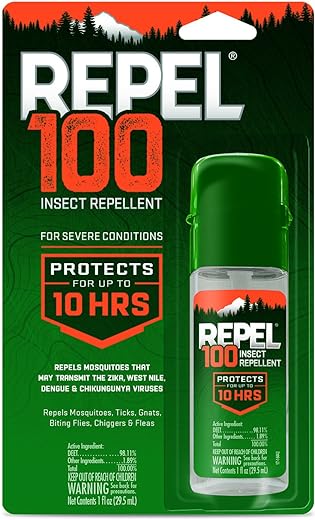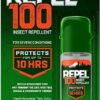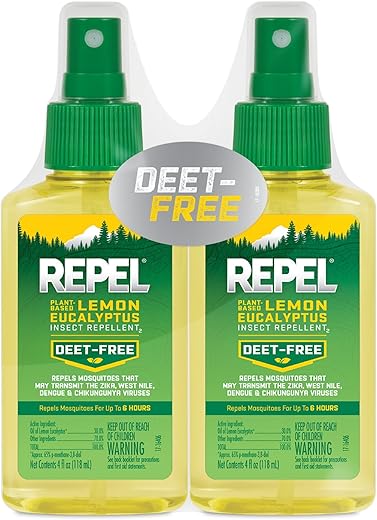
Welcome, fellow adventurers! Today, we’re going to delve into a topic that might not be as glamorous as deciding which tropical paradise to explore next, but is equally important for your travel safety: insect repellents. While these magical potions protect us from those pesky critters, it’s essential to be aware of their potential side effects. After all, we want you to enjoy your travels itch-free and worry-free. So, let’s dive into the world of insect repellents and discover what you need to know to make informed choices.
Stay bite-free on your adventures with our top-rated travel insect repellents!
Understanding Insect Repellents
Insect repellents are an essential tool for keeping pesky bugs at bay, especially during those warm summer months. Whether you’re planning a camping trip, a hike in the woods, or simply enjoying a backyard barbecue, it’s important to choose the right insect repellent to protect yourself and your loved ones from bites and potential diseases. In this blog section, we’ll delve into the world of insect repellents, providing you with the knowledge you need to make an informed decision.
How Do Insect Repellents Work?
Insect repellents work by either masking the scents that attract insects or by repelling them altogether. Let’s take a closer look at the two main types of repellents:
1. Chemical Repellents
Chemical repellents are the most common type and are available in various forms, including sprays, lotions, and creams. These repellents contain active ingredients that interfere with the insect’s ability to locate their target by blocking their receptors or confusing their senses. The most popular active ingredients found in chemical repellents include:
- DEET: The gold standard in the world of insect repellents, DEET is highly effective in repelling a wide range of insects, including mosquitoes, ticks, and flies. It provides long-lasting protection and is available in different concentrations, typically ranging from 10% to 30%. Brands such as Off!, Cutter, and Repel offer DEET-based repellents.
- Picaridin: A relatively newer ingredient, picaridin is a synthetic compound that has gained popularity due to its effectiveness and low odor. It is considered as effective as DEET against mosquitoes and ticks and is less likely to cause skin irritation. Brands such as Sawyer, Natrapel, and Avon offer picaridin-based repellents.
- IR3535: This active ingredient is a synthetic version of a naturally occurring amino acid. It is effective against a range of insects, including mosquitoes, ticks, and flies. Skin So Soft Bug Guard by Avon is one well-known repellent containing IR3535.
2. Natural Repellents
If you prefer to go the natural route, there are repellents formulated with plant-based ingredients. However, it’s important to note that natural repellents generally provide shorter protection compared to chemical repellents and may need to be reapplied more frequently. Some common natural repellents include:
- Citronella: Derived from the leaves of the lemongrass plant, citronella oil is a popular natural repellent against mosquitoes. You can find citronella-based repellents from brands like Repel and BiteBlocker.
- Lemon Eucalyptus Oil: This oil, extracted from the lemon eucalyptus tree, contains a compound called PMD (para-menthane-3,8-diol) that is effective against mosquitoes. Cutter and Repel offer repellents with lemon eucalyptus oil as the active ingredient.
Choosing the Right Repellent for Your Needs
When selecting an insect repellent, it’s important to consider a few key factors:
- Effectiveness: Look for repellents with proven effectiveness against the particular insects you want to repel, such as mosquitoes, ticks, or flies.
- Duration: Consider the length of time the repellent will provide protection. This is especially important if you plan to be outdoors for an extended period.
- Formulation: Choose a formulation that suits your preferences and needs, whether it’s a spray, lotion, or wearable device.
- Concentration: The concentration of the active ingredient can affect the repellent’s effectiveness and duration. Higher concentrations generally provide longer-lasting protection.
- User-friendliness: Consider factors such as odor, texture, and ease of application. Some repellents may be more suitable for children or individuals with sensitive skin.
Final Thoughts
Insect repellents are an indispensable tool for keeping pesky bugs at bay and protecting yourself from bites and potential diseases. By understanding the different types of repellents and their active ingredients, you can make an informed decision on which product best suits your needs. Remember to follow the instructions provided by the manufacturer and reapply the repellent as needed for optimal protection. Stay bug-free and enjoy the great outdoors!
Potential Side Effects
Insect repellents are a great tool to protect ourselves from pesky bugs and the diseases they carry. However, it’s important to be aware of the potential side effects that may arise from their use. In this blog section, we will explore both the common and more severe side effects that can occur, ensuring you have all the information you need to make an informed decision.
Common Side Effects
1. Skin Irritation
One of the most common side effects of using insect repellents is skin irritation. Some individuals may experience redness, itching, or a rash after applying these products. This is usually a result of sensitivity to the active ingredients found in the repellents.
- Example: Brand X Mosquito Repellent Spray has been reported to cause mild skin irritation in some users.
2. Allergic Reactions
In certain cases, individuals may have an allergic reaction to the ingredients present in insect repellents. This can lead to symptoms such as hives, swelling, or difficulty breathing. If you have a known allergy to any specific ingredient, it is crucial to carefully read the label before using a product.
- Example: Product Y Tick Repellent Lotion contains an active ingredient that some people may be allergic to, causing an allergic reaction upon contact.
3. Eye Irritation
Another potential side effect of insect repellents is eye irritation. If the product comes into contact with the eyes, it can cause redness, stinging, or watering. This can be particularly concerning for individuals who wear contact lenses.
- Example: Model Z Mosquito Repellent Wipes should be used with caution around the eye area to avoid irritation.
Rare but Severe Side Effects
While the common side effects mentioned above are relatively mild and temporary, it is important to be aware of the rare but severe side effects that can occur. These side effects are less common but should not be ignored.
1. Respiratory Issues
In some rare cases, the inhalation of insect repellent aerosols or vapors can lead to respiratory issues. This includes symptoms like coughing, wheezing, or shortness of breath. It is crucial to use these products in a well-ventilated area and avoid prolonged exposure.
2. Neurological Effects
Certain insect repellents containing chemicals like DEET have been associated with rare cases of neurological effects. This can include symptoms such as confusion, dizziness, or seizures. However, it is important to note that these cases are extremely rare and typically occur with excessive or improper use of the product.
Factors to Consider
Insect repellents are a valuable tool in protecting yourself and your loved ones from pesky and potentially dangerous insects. However, not all insect repellents are created equal, and it’s important to consider a few key factors when choosing and using these products. In this article, we will outline the factors that should be considered when using insect repellents, ensuring that you make an informed decision to maximize your protection.
1. Follow Instructions for Effective Use
Why is this important?Proper usage of insect repellents is crucial to ensure their effectiveness and minimize any potential risks. Each product comes with specific instructions that should be carefully followed to achieve the desired results.
Key points to remember:
- Apply the repellent only on exposed skin or clothing, as directed.
- Avoid applying it near eyes, mouth, or any irritated or broken skin.
- Wash your hands after application to prevent accidental ingestion.
- Reapply the repellent as instructed, especially after swimming or excessive sweating.
2. Choose the Right Formulation for Your Needs
Why is this important?Different insect repellents are formulated to protect against specific types of insects. Choosing the right formulation will ensure efficient protection against the particular pests you are most concerned about.
Key points to consider:
- Look for ingredients that are effective against the specific insects you are trying to repel. For example, DEET-based repellents are known to be effective against mosquitoes and ticks.
- Consider the duration of protection required. Some products provide long-lasting protection, while others may need to be reapplied more frequently.
- Take into account any personal preferences or sensitivities. Some individuals may prefer fragrance-free or natural-based repellents.
3. Understand the Risk-Benefit Balance
Why is this important?Insect repellents contain active ingredients that may have potential risks associated with their use. Understanding the risk-benefit balance will help you make an informed decision about the level of protection you require and the potential risks you are willing to accept.
Factors to consider:
- Evaluate the prevalence of insects in your area and the diseases they may carry. This will help you assess the necessity of using insect repellents.
- Consider your individual susceptibility to insect bites and any pre-existing health conditions that may increase your risk.
- Consult a healthcare professional if you have specific concerns or questions about the safety of a particular repellent.
By carefully considering these factors, you can choose and use insect repellents effectively, ensuring the best possible protection against bothersome and potentially harmful insects. Remember, protecting yourself and your loved ones from insect bites is essential, and with the right repellent, you can enjoy the outdoors with peace of mind.
Disclaimer: The information provided in this article is for informational purposes only and should not replace professional advice. Always read and follow the instructions provided by the manufacturer of the insect repellent product you choose.
Alternative Options
When it comes to protecting ourselves from pesky insects, many of us turn to chemical-based repellents. However, concerns about the potential side effects of these products have led to an increased interest in alternative options. In this blog section, we will explore natural repellents and protective clothing as potential alternatives that are both effective and safer for your health and the environment.
Natural Repellents
Natural repellents are a great alternative for those who prefer to avoid chemical-based products. These repellents often utilize plant-based ingredients that naturally repel insects. Let’s take a look at some popular natural repellents:
- Citronella: Derived from the leaves of a certain species of lemongrass, citronella oil is a well-known natural insect repellent. It is commonly used in candles, sprays, and lotions. Some popular brands that offer citronella-based products include BiteBlocker and Badger Balm.
- Lemon Eucalyptus: The oil extracted from the lemon eucalyptus tree is another effective natural repellent. It contains a compound called PMD (p-menthane-3,8-diol) that has been proven to repel mosquitoes. Repel Lemon Eucalyptus is a trusted brand that offers this type of repellent.
- Essential Oils: Certain essential oils, such as lavender, peppermint, and tea tree oil, have insect-repelling properties. They can be used individually or combined to create a personalized repellent. Now Essential Oils offers a wide range of high-quality essential oils that can be used for this purpose.
Natural repellents offer a safer alternative to chemical-based products without compromising effectiveness. However, it’s important to note that their protection may not last as long as chemical repellents, so reapplication is often necessary.
Protective Clothing
Another alternative option to consider is protective clothing. By covering your skin with appropriate clothing, you can create a physical barrier between yourself and the insects. Here are some key points to keep in mind:
- Long Sleeves and Pants: Wearing long-sleeved shirts and long pants can protect your skin from insect bites. Opt for lightweight and breathable fabrics to ensure comfort, especially in warmer climates. Brands like ExOfficio and Columbia offer a range of insect-repellent clothing options.
- Permethrin-treated Clothing: Permethrin is a synthetic insecticide that can be applied to clothing to repel insects. It is highly effective against ticks, mosquitoes, and other insects. Many outdoor clothing brands, such as Insect Shield and Sawyer, offer permethrin-treated garments.
- Head Nets and Gloves: If you frequently find yourself in insect-infested areas, consider using head nets and gloves for added protection. These accessories can be particularly useful during activities such as camping, hiking, or gardening.
Protective clothing is a great option for those who prefer not to apply repellents directly to their skin or who need long-lasting protection. It can be used in conjunction with natural repellents for maximum effectiveness.
Understanding the risks: A closer look at the potential side effects of insect repellents
In conclusion, it’s important to be aware of the potential side effects of using insect repellents. While they are effective in protecting against insect bites, it’s crucial to balance the benefits with the risks. If you experience any adverse reactions, it’s best to consult a healthcare professional and consider alternative options. Remember to always follow instructions for safe and effective use.













Overall, this article raised awareness about the potential side effects of insect repellents. It’s important to weigh the benefits against the risks when using them.
I have personally experienced some of these side effects, such as skin irritation and allergic reactions. It’s good to know what to watch out for.
I appreciate the advice on choosing natural and DEET-free insect repellents. It’s important to consider the potential health risks when using chemical-based products.
The article could have included some tips on how to minimize the side effects, like applying the repellent sparingly or using it only when necessary.
I would have liked to see more information on the long-term effects of using insect repellents. Are there any studies on this?
I was surprised to learn that inhalation of insect repellents can cause respiratory issues. It’s something to be cautious about, especially when using sprays.
It’s great that the article mentioned the importance of avoiding contact with eyes and mouth when using insect repellents. Safety precautions are crucial.
I found this article very informative. It provided a comprehensive list of potential side effects of using insect repellents.